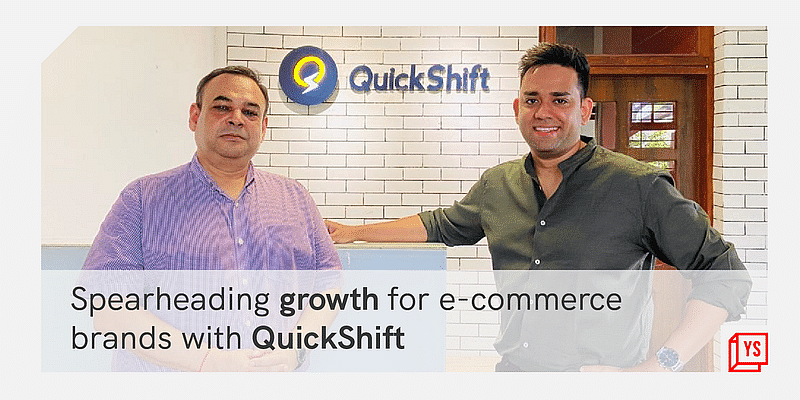Not long ago, logistics was an element that a brand needed to look into to streamline its supply chain operations. That has undergone a massive and meteoric evolution with logistics playing a major role in driving a better brand experience. “Today, one of the critical factors governing customer experience and expectation is the speed of delivery,” underlines Anshul Goenka, CEO and Founder, QuickShift, a growing 3PL (third-party logistics) provider.
Headquartered in Pune and with its self-owned network of decentralised warehouses across locations in India and data-driven technology, the e-commerce fulfilment company helps brands to streamline their storage, distribution, and fulfilment across retail, wholesale, and e-commerce channels. The startup in addition to providing standard delivery services, also provides same-day delivery and a three-hour delivery as its most recent offering.
Delivery speed: Growth factor for brands
At the start of this year, QuickShift launched its QS-Rapid program of same-day deliveries through in-transit hubs in Mumbai and is working on following it up with opening the transit hubs in Delhi-NCR, Bengaluru, and Kolkata. The launch of these transit hubs is part of its latest offering – QS-Rapid – where it will enable D2C brands to deliver their shipment within the same day of order.
Anshul believes that the Rapid model would be a game changer. “The age of quick commerce has arrived in India and we are witnessing that in the grocery and food category. With QS-Rapid, we are not targeting the 10-minute delivery promise but we’re looking at a time frame of four-six hours for categories such as nutraceuticals, personal care, wellness and also fashion, accessories and footwear. where delivery timelines are critical,” he says. The advantage is that the inventory is already available through Quickshift’s distributed inventory plan.
With QS-Rapid, QuickShift has established an express mode to pick-pack and ship order to centrally located in-transit hubs that then connect on to last mile delivery bikers. “While it is in its early weeks of launch, we have seen that the return rates dip down to almost 4 percent,” says Anshul, explaining that a faster delivery directly impacts returns because the very nature of shopping has become largely impulsive today. “A lot of customers shop because they like that product or want that product at that instant. And, when the product reaches them after a gap of five days, which was the case earlier, they might no longer be attracted to that product which then increases the probability of product returns. The need for speed has become absolute,” he says.
QS-Rapid also offers brands the ability to directly interact with customers and forge a relationship. “With QuickShift Rapid, a brand can independently scale up without being dependent on a retailer. They are able to leverage the data pertaining to their brand to retarget, or remarket the product,” shares Prodipto Roy, Co-founder, QuickShift.
Currently witnessing exciting traction, QuickShift Rapid is in talks with a number of brands, some of whom are traditional big retailers who are looking to launch their private labels. QuickShift is developing an omnichannel model too. “We realise that many companies have already got inventory placed within cities and also have to service online orders. Many of these companies need last mile delivery service connecting the online orders to current inventory points and taking it right up to customers’ doorstep with all features that consumers have got used to, viz COD, notifications, tracking, returns, etc.” he quips.
While QuickShift has always been vocal about how the company has been built for speed, 2022 has seen the company ‘accelerating’ its own growth and offerings. About 20 percent of its existing brands have already been onboarded on QuickShift Rapid and that number is steadily on the rise. In addition, the e-commerce standard fulfilment company serves close to 26,000 pin codes across the country and processes about 10,000 orders across categories such as apparel, beverage, fashion, electronics, wellness, and others.
Logistics as a transformative experience
“When we started in 2018, the idea was to become a full-stack solution for any brand that is going online for the first time and even for brands looking to scale across India. So we worked on standardising our offerings and making sure that there was a good interplay of technology, infrastructure and services combined, to be able to make it seamless for a brand to go online and reach out to millions of customers,” explains Anshul. “Logistics was still seen as a cost centre. We wanted to change that narrative. We wanted logistics to be an efficiency centre, an enabler for the brands.
Prodipto opines that e-commerce has undergone a significant evolution in the last five years. “Typically, brands, especially traditional brands, saw e-commerce as a way to liquidate their stock. E-commerce was a secondary sales channel. But, with e-commerce fulfilment solutions like QuickShift, we are increasingly able to show the brands how e-commerce can contribute to a significant portion of their sales volumes,” he says. He shares how QuickShift was able to spearhead the transformation of an Indian textile and apparel conglomerate client. “Nearly 95 percent of the brand’s sales happened offline. Amidst the COVID-19 pandemic, they onboarded QuickShift to ramp up their online and e-commerce sales. Today, 40 percent of their sales come from e-commerce and their own website. And, we spearheaded that transformation for them,” he adds.
Anshul explains that their work with the Indian textile conglomerate client is just one of many enterprise customers and traditional brands which have benefited from QuickShift. “Many of them don’t have the relevant expertise or network to go online. With QuickShift, they have been able to really see the tangible benefits of going online,” he adds.
Growth projections and plans
A 2021 study by consulting firm RedSeer’s early-stage research arm, RedCore, has predicted that the road logistics market in India is expected to grow at a compounded annual growth rate (CAGR) of 8 percent in the next five years, touching $330 billion by 2025. Titled ‘Inter-city Logistics Market Study’, it noted that this rise was expected to be fuelled by factors such as the rapidly growing e-commerce sector, among others. The inter-city road logistics spend in India stood at $209 billion in 2021, accounting for around 87 percent of total road logistics spend, as per the study. The findings align with that of a 2019 McKinsey Global Institute (MGI) report which predicted that India’s logistics sector would at least touch $320 billion in 2025.
Anshul agrees that the industry findings are reflected in QuickShift’s experience on ground. “In 2018-19, our consolidated fulfilment centre space stood at 30,000 sq ft. We now have 1,80,000 sq ft of fulfilment space spread across five cities. Having started with just five brands, we currently serve 150+ brands including Fresh to Home, Arvind, Society Tea, and Neeman’s.
The CEO explains that in addition to the industry push, another factor that has propelled QuickShift’s adoption in the market is that they have been able to identify the triggers and drivers in the domestic market, especially with respect to fulfilment opportunities. “There is a huge surge of D2C online-first brands and traditional brands going online. But, there is a lack of expertise in terms of how a brand can scale up online. We see ourselves fitting right there and being able to push the lever for these brands. Customised packaging, attention to detail, flexible pricing are just some of the few steps on these lines.” he says.
While QuickShift has seen a 120 percent YoY growth in the last three years, it’s still just a small percentage of what the future is likely to unfold. “Only a handful of D2C brands have crossed the Rs 500 crore-mark in the market. Next couple of years, we are likely to see these brands grow anywhere between 10x to 20x,” says Anshul. The e-commerce fulfilment company has its roadmap cut out clearly. “We are fortunate to be in a space, where there are a lot of inbound requests coming in from the demand side. So, we have been concentrating on getting the supply chain equation right and standardising them,” he adds.
As a brand grows, it is important for their partners and agencies to be able to keep up with the rapid acceleration in terms of creating enough supply in terms of inventory, processing capacity, pincode serviceability, speed, etc. “The plan for us is very simple – to be able to strengthen the robustness of our technology so that we can continue to not just provide the experience that we do today, but also ensure that we bring together the different moving part of the supply chain operations onto one platform and build a seamless experience for our partnering brands. We are going a step ahead in creating Business Intelligence for our customer brands, by providing them data and insights to fuel their business, through sophisticated technology integration,” adds Prodipto. From marketplace listing to inventory management to fulfilment management, QuickShift brings all these different functions together on one platform. In addition, the startup is also building its capacity to be able to process at least 50,000 orders on a daily basis.
After raising $770,000 in seed round from Anicut Angel Fund and Axilor Ventures in 2021, the startup has grown multifolds and is paving the roadmap for further rounds. “Our upturn has been steady and the business metrics are also positive. And, we see infusion of funds helping us scale up further,” says Anshul.
A quick rewind
What started out as a team of about four people is now a 45-member team and growing. “One of the things that has helped us in building this team is to stay aligned with the company’s vision and mission and carry out the execution. We are customer-centric and that reflects in what we bring to the table in terms of our technology solutions and the problems we are able to solve for our customers. As a company, we understand how critical speed is and more so when it comes to failing. We are open to failing fast, failing fast to grow,” shares Anshul. He says that the last few years have been exciting for QuickShift. And, the first three months of 2022 are anything but an indication of what is likely to come ahead. “In a way, we are just getting started,” he concludes.










